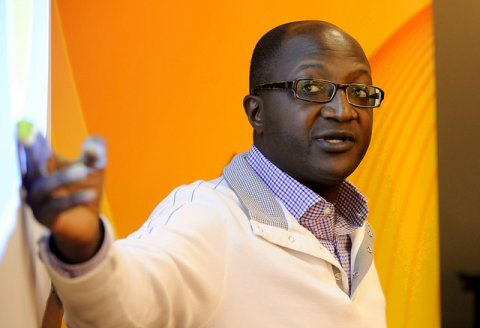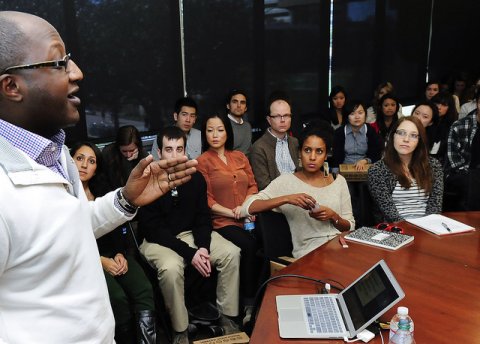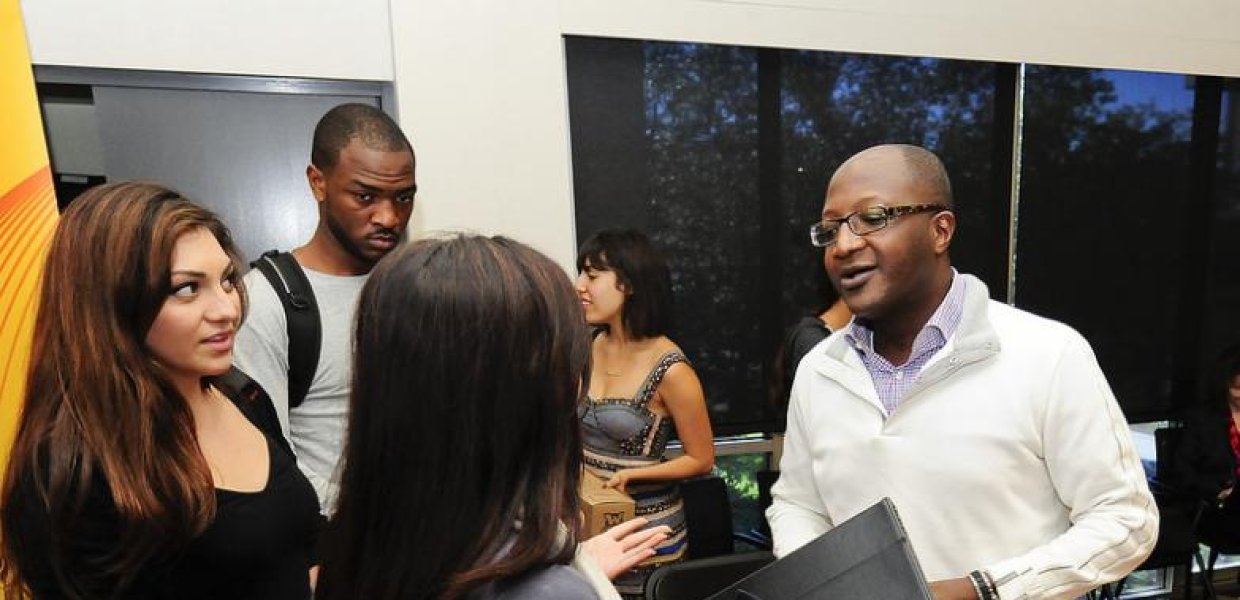Facebook's Kay M. Madati joins Katelyn Foley for an in-depth discussion on Facebook's efforts to help entertainment and media partners cultivate a successful presence on the social network. Madati served as the M{2e} program's Executive-in-Residence in January 2013.
Twitter gets a lot of attention as the second screen platform that audiences use while watching TV, even though recent data has shown that Facebook typically generates more conversations around TV shows. Facebook recently debuted hashtags to facilitate these conversations. How does your team think about Facebook's social TV strategy going forward?
I think the content produced drives opportunities for live conversation, whether it’s us or Twitter or some of the other social players in this space. The real opportunity is in scaling that conversation.
From the Facebook perspective, when we have dug into the data, we have found that the scale of conversation happens at an unprecedented level. People take those water cooler moments around live programming or events like the Olympics or Elections and expand them on Facebook.
When we have looked at primetime television viewing habits, we know that there are 80 to 110 million people who are on Facebook during primetime between 8 and 11 pm. That presents an opportunity for anyone who wants to generate audience engagement, and dwarfs anybody else who might want to play in this space. For example, the Oscars generated 7 million tweets versus 69 million Facebook interactions, including Likes, comments, and shares.
In the television game, every television show will win if you can bring new people to that discussion. It’s not just about engaging the people who are there already. You have to grow your audience. Primetime is the opportunity. It’s the backdrop to how you make your conversation in and around your entertainment content that much more engaging.
There are a lot of producers and content makers asking celebrities to engage on social media as a secondary way to tell a story to their existing audience. What examples have you seen of producers or show runners growing their audience?
There are three basic categories: before the show, during the show, and after the show. When you talk to digital producers or TV producers, there is a lot of focus on ‘the during’ the show aspect. The engagement while somebody is watching it, like voting when you are watching “American Idol”. Those are important opportunities particularly around live TV or sports.
But when we consider the need to actually grow the audience, it’s what happens ‘before the show’ and ‘after the show’ that really matters. This is where Facebook leads and continues to lead as we look at our future road map. The core reason being that Facebook is an environment for continuing that conversation with your audience, and leveraging the many native platform tools to do so.
There are a variety of answers to who has done it well. “Dallas” on TNT, AMC’s “Walking Dead,” Fox’s “New Girl,” “Pretty Little Liars” on ABC Family, “Agents of the Shield” most recently on ABC, “The Blacklist” on NBC – these and many more. These aren’t accidents. On “The Shield”’s Facebook page, they went from zero fans to north of a million before it even premiered. They spent 3 to 4 months programming a Facebook presence, building the audience, and getting people excited about the content even before it was on television. That’s really the opportunity for social, I think. ‘How do you get people engaged, aware, discovering this content even before it gets on the television?’ And then, can you keep those people interested in between episodes? In between seasons? That is the new creative canvas, and the opportunity for Social TV at scale.
I think AMC’s “Walking Dead”, year over year, does a great job of what I would call bridge strategy programming. When the show is not on television, they are still working hard to generate conversation with the fans on their page. And every season since they have started to do this robustly on Facebook, they have seen real success.
I am not saying there is a silver bullet answer to this. But I am saying the work and investment that you put into building a community and keeping them engaged deserves it’s own programming strategy. You should be programming your social destinations just the way you would spend time programming your television network.
Social networks have done a fantastic job facilitating social storytelling in conjunction with entertainment properties. How do Facebook and its entertainment partners such as large studios think about transmedia approaches to the entertainment product itself? What have been some of your favorite entertainment campaigns on Facebook?
Facebook presents a content producer with an opportunity to tell a complementary programming narrative, and that in of itself has implications. You now need your teams to be thinking about how that digital/social story complements the core television narrative. Once you have worked out the framework around these things, everything in the marketing roadmap becomes an asset for the social narrative – PR/Publicity, offline events, TV ads, digital stunts, talent/celebrity appearances … etc. etc.
We encourage our partners to take a look at their page insights, understand who the audience is, take a look at what their interests are and scope the strategies based on those things. Programming against those insights can derive real results. And every time we see somebody invest the time, they have been able to grow audience and engagement and ultimately have it translate into successes with other key KPI’s.
 It seems like these strategies for live TV are actually quite similar to how you would handle longer tail content like “Orange Is the New Black” on Netflix. Is this the case?
It seems like these strategies for live TV are actually quite similar to how you would handle longer tail content like “Orange Is the New Black” on Netflix. Is this the case?
Yes, I think it is. I have sat in front of Hollywood producers that purely focused on producing a great television show. But on the other hand, there are also producers who have dedicated time, people and resources to building an audience for new IP before it even gets on television. That’s a different way to think about the potential production timeline. It’s a different allocation of time and resources.
If you are Vin Diesel and you have 50 million fans on your page, that’s an audience. And why wouldn't you let them know, as he is right now, that he is onset in Atlanta filming the next “Fast and Furious 7”; and finding organic ways to keep people interested in the things you are doing in and around a content opportunity.
Shifting back to the live TV value proposition, I know that from the view of TV networks and advertisers, TV-synced social ads are a top priority right now. How is Facebook thinking about implementation of this type of ad and what types of partnerships would be required?
TV networks care a lot about this question because they want to provide more value to their advertisers. Let me just broadly say that finding a way to help our television partners extend an incremental value to an advertiser around a content property and leveraging that into the social space is something that we are eager to partner with them on.
Fox has “The X Factor”, which is one of the most social shows on television, and Pepsi is a sponsor. There is an opportunity for all of us—Fox, Facebook, Pepsi—to start thinking about how to make Pepsi’s involvement in the show that much bigger, that much better by tapping into their fan base on Facebook. Now, how that iterates is part of the conversation with networks and our partners as we all try to figure out the right way to add value.
I would now like to transition to branded content. It is an interesting area to me because entertainment companies have an extremely valuable product, and so by nature they are very protective of it. But the Pepsi’s and the Chipotle’s of the world are putting out incredible content about a soda can or a scarecrow. How does Facebook plan to incorporate branded content in the future?
Pretend you are Pepsi. Why are you interested in “The X-Factor”? Not just because it’s a hit show. If you think about Pepsi’s marketing strategy over the past decade, there was a reason why they had Ray Charles or Mariah Carry and Michael Jackson. Pepsi has been at the forefront of being the next generation brand that brings to you the most relevant and compelling music and entertainment content today. My guess is that if you are the CMO of Pepsi, one possible reason you are interested in “The X-Factor” is because you want to perpetuate your association with your brand in and around entertainment content.
Facebook has a great value proposition for branded content because it doesn’t feel strange for entertainment content to be sponsored by brands that are on Facebook. You already associate these brands with the content you have watched on television anyway. Branded content is not about inventing something new. It is about extending the strategies that brands are employing in and around entertainment content already. I heard an advertising guy say years ago that every brand is a content producer.
I used to work at BMW and we did the BMW films and the James Bond integrations. I sometimes like to think about what if Facebook had existed at this scale when we did the BMW films. The BMW films were an enormous success. 90 plus million people had downloaded these films, and this was back when it would take twenty minutes to download something. What if we could have actually scaled that engagement? It would have been ten times bigger than it already was. And what was the difference? It wasn’t that BMW suddenly wanted to become a film producer – instead we just understood that this could be a medium where you could tell a narrative that was consistent with the brand. There’s no question that those films are great showcases for what the brand is all about. But they are also entertainment. Branded entertainment doesn’t have to feel like advertising.
 When Facebook initially became a marketing tool for the Fortune 500, many executives were focused on the number of "Likes" to determine success. How do entertainment companies think about ROI on Facebook today? For example, what are some of the key performance indicators that film executives use when predicting box office performance?
When Facebook initially became a marketing tool for the Fortune 500, many executives were focused on the number of "Likes" to determine success. How do entertainment companies think about ROI on Facebook today? For example, what are some of the key performance indicators that film executives use when predicting box office performance?
The question is asked from the Facebook perspective, but I tend to ask it from a partner perspective. In that sense, the KPI’s haven’t changed. The two key biggest drivers for somebody to go see a movie are:
I saw the trailer,
Somebody told me about it—a friend-to-friend recommendation.
Then right behind those two might be critics.
In television, sampling and discovery help drive a show discovery and awareness. If those are your KPI’s, then you should structure your strategies on social platforms to be able to point towards these different things.
There is no silver bullet answer. I cannot tell you that a lot of people who are engaging on a page are going to turn into people who tune in. But we have seen data across a number of successful projects that hint at that. What I like to say to our content producers is that Facebook is the biggest discovery platform you will ever have. Facebook is the place where people tell people that this is something you should care about. They do it because you pull them into getting excited about it in some way that they want to take an asset of yours, post it on their page, and say you need to watch this, you need to read this.
Take a look at your own Facebook behavior … I am sure that you, like most people, discover ten things that they never would have read, never would have seen, never would have known about, had it not been brought to them by their Facebook friends, their fans, and their connections with brand pages.
Switching over to video ads for a second. I have heard that Facebook is currently working on rolling out video advertising. How do you think this offering will change the way entertainment companies are marketing on the site?
Video ads are super important to film and television. Let’s just say that video as an opportunity on our platform for how you can engage more earnestly with users, as such it is very important to us.
The entire ecosystem from measurement to the information you can find about what people consume to the ability to go out and put video in front of 80 to 110 million people daily and to be able to do it on mobile as well is important and will be valuable to anybody who has content and wants people to know about it. I’m excited about where we are going as a company when it comes to video in general. I was really excited to see Instagram successfully step into video too.
One last question around content. In the future, would Facebook ever invest in content (like Yahoo! or Amazon) or facilitate content makers (like Google)? Or does Facebook consider itself more of a distributor? If so, do you see the site becoming more of a content hub?
We are absolutely bullish about helping our partners who are content producers to scale discoverability and awareness for their content on our platform. As an avid watcher of the industry, I am very interested in watching Hulu, Netflix, and Amazon’s moves into the original content space. I think it is a very interesting iteration of the television business and it might be indicative of the future. Do we want to get into that business? … I think we are really happy and honored that we have the opportunity to help our partners figure out how they can scale visibility with their own content efforts. So it’s Facebook + Television, not Facebook vs. Television.
